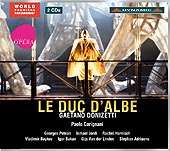|
Back
12/12/2013
Gaetano Donizetti: Le Duc d’Albe
George Petean (Le Duc d’Albe), Ismael Jordi (Henri de Bruges), Rachel Harnisch (Hélène d’Egmont), Vladimir Baykov (Sandoval), Igor Baken (Daniel), Gijs Van der Linden (Carlos, Balbuena), Stephan Adriaens (Un tavernier), Chorus of the Flemish Opera, Yannis Pouspourikas (chorus master), Symphony Orchestra and Chorus of the Flemish Opera, Paolo Carignani (conductor)
Live stage production from the Vlaamse Opera Ghent (11 May 2012) – 142’08
Dynamic CDS 7665/1-2 – Notes and synopsis in Italian and English

   
While this work is listed as an opera by Donizetti, the truth about the opera and especially about this world premiere recording is much more complicated. The work was commissioned by the Paris Opera in 1844, during the great years when the rules governing grand opera were in force. Eugène Scribe and Charles Duveyrier wrote the libretto. For various reasons the production was cancelled before the composition was completed; Donizetti wrote just one more opera before catastrophic illness ended his career. The libretto, with changes, was used by Verdi for his Les Vêpres siciliennes of 1855. In 1882 a translation into Italian (thus Il duca d’Alba), completed by a team headed by Matteo Salvi, once a student of Donizetti, was premiered in Rome. Another version of the Donizetti-Salvi edition was made by Thomas Schippers for a 1959 production at the Spoleto Festival.
Readers might be familiar with the aria “Angelo casto e bel” - it is sung by Joseph Calleja on his fine CD The Golden Voice. It was actually composed by Salvi. (On this recording it appears as “Anges des cieux”).
For this 2012 production at the Flemish Opera the original French libretto (in a critical revision by Roger Parker) has been used, with the addition of sections never previously composed by Donizetti or anyone else. They are by Giorgio Battistelli (born 1953), a composer with a lengthy list of operas to his credit. Unlike other composers who have completed someone else’s work (Franco Alfano for Puccini’s Turandot, Friedrich Cerha for Berg’s Lulu) Battistelli has made no effort to create anything in the style of the work’s nominal composer - there are no Donizetti-like tunes, forms or cadences. He has contributed a couple of dramatic insertions and, most important of all, the entire 11-minute closing scene of the opera when the broken-hearted duke mourns the death of his son; this leads into a moving finale for soloists and chorus. Battistelli’s sections are reminiscent of Britten and his completion of the work takes it into a whole new transcendent realm. The result won’t please everyone, but I find it an effective treatment of a tragic denouement that avoids the formulaic. One wonders, though, if any other company would take up the work with this completion.
Like so much grand opera as established by the productive and influential Eugène Scribe, the libretto takes a set of historical events and then creates a tangle of interpersonal relationships to be worked out with the participation of the all-important chorus. It is set in the 1570s when the historical Duke of Alba has successfully led the Spanish conquest of the Low Countries at a point that turns out to be just the beginning of the Eighty Years War. A young hothead, Henri de Bruges, is a leader of the Flemish insurgency - and it turns out that he is the duke’s son. Henri’s beloved is Hélène, the daughter of the executed Count Egmont. She is an ardent plotter against the Spaniards and cannot understand why Henri seems to be favoured by the duke. The climax of the drama occurs when she tries to stab the duke but Henri intervenes and as a result she kills him by mistake. The final tableau is reminiscent of King Lear.
The recording has the benefits and drawbacks of a live performance. There is a good degree of dramatic urgency although at times voices advance and retreat from the microphone placements. There is some stage noise, but nothing damaging. The opening chorus sounds rough-hewn but one must take into account that it is actually two opposing choruses singing at the same time: boastful Spaniards lording it over resentful Flemish who are plotting insurrection. Overall, Paolo Carignani carries the piece through its varied moods, not to mention the modern interventions, although a couple of dramatic moments seem understated.
The singers are all aptly cast for their roles, but at the same time no-one achieves the vocal profile and consistency one wants in order to declare a truly starry performance. The exigencies of the staging are probably a factor here. Rachel Harnisch as Hélène d’Egmont has the right lyric tone plus she manages to convey the character’s anger and frustration. (One can only imagine what Verdi would have done with the libretto in the 1840s, when he was composing Nabucco and other fire-breathing works.) Ismael Jordi as Henri has a fine bel canto voice and manner. George Petean gives a good account of the conflicted title role. Vladimir Baykov makes a vivid impression as Sandoval, the relentlessly triumphalist Spaniard who cannot understand why Henri has not been executed. Igor Baken is sympathetic as the Flemish insurgent (and brewer), Daniel.
The recording comes with no libretto - BUT the thoughtful, clever people at Dynamic have posted it on their website where you can find a French-English side-by-side libretto as well as a French-Italian translation. You can print this (22 pages) or read it on your ipad. Other labels issuing recordings of recondite works, please take note!
It is hard to predict whether this completion of Le Duc d’Albe will give the work a new lease on life or simply add a bit of amplitude to its current status as a footnote to Donizetti’s huge output. I for one find it compelling and would be eager for the chance to see a production.
Michael Johnson
|